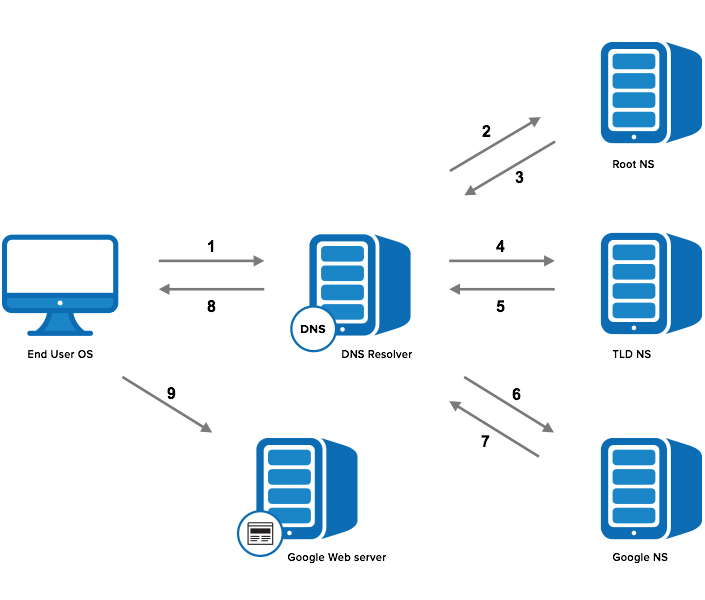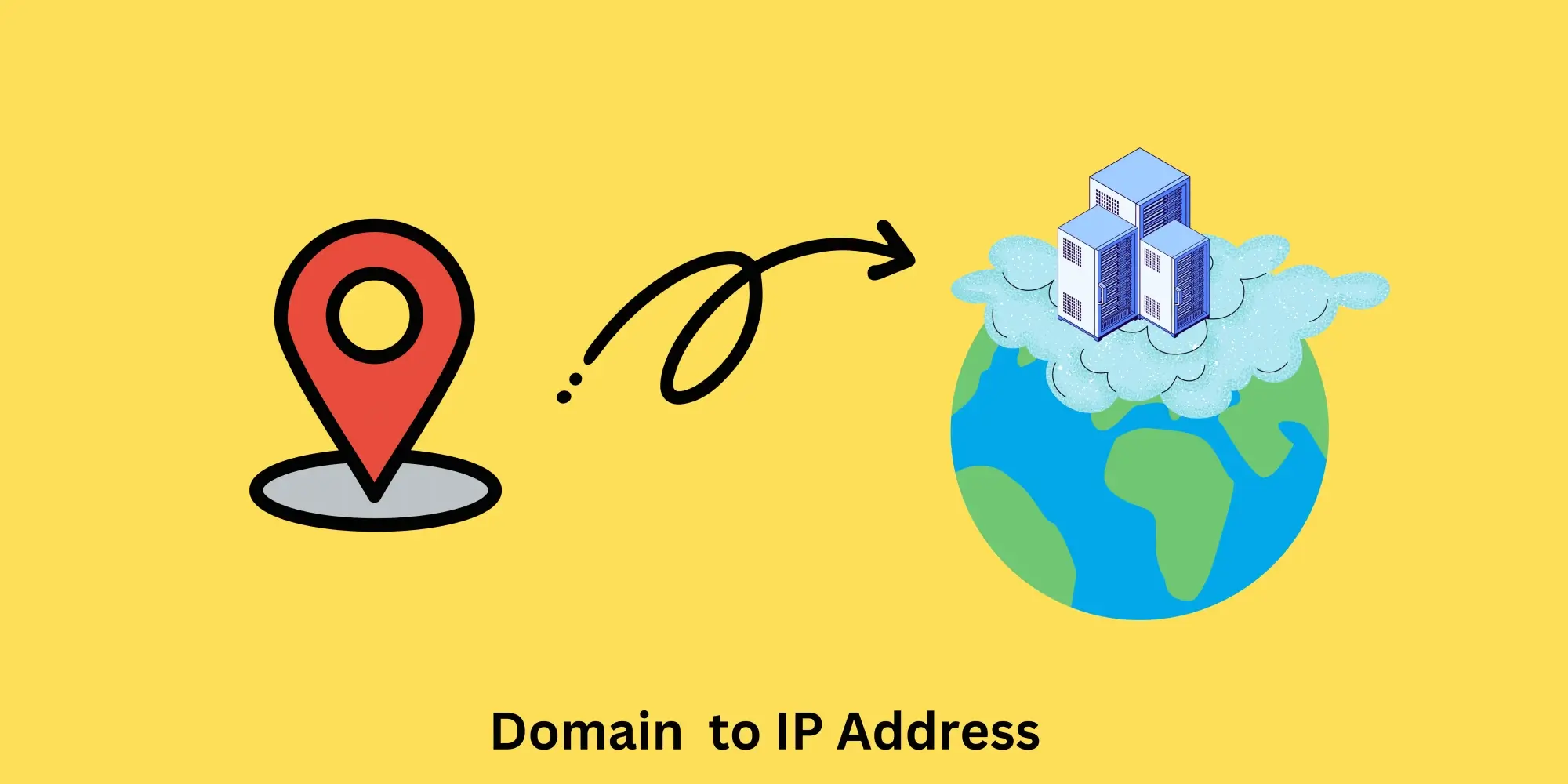Domain To IP
The Domain to IP tool allows you to find the IP address associated with any domain name, providing accurate and instant results. This tool is perfect for webmasters, developers, and network administrators who need to identify the IP address of a website for troubleshooting, security, or configuration purposes. The process is simple and efficient, ensuring you get precise IP information every time.
Share on Social Media:
Quick Domain to IP Conversion: Discover Any Website's IP Address
Looking to convert a domain to its IP address? In this guide, we break down the ‘domain to IP’ conversion into simple steps, highlighting the use of PagesTools.com among other methods to achieve swift outcomes. Gain clarity on this essential online task and master the tools for effective IP discovery.
Key Takeaways
The Domain Name System (DNS) is essential, translating domain names into IP addresses, enabling browsers to connect users to the correct website server.
Online Domain to IP conversion tools and APIs offer convenience, efficiency, and added value with features like DNS caching, geolocation data, and access to whois databases for comprehensive IP address information.
For accurate IP address retrieval, users can employ various methods including command-line utilities like nslookup and dig, various online services, and can ensure accuracy by verifying results across multiple tools and understanding the impact of cached search results.
Exploring Domain to IP Conversion

A journey through the digital universe starts with gaining knowledge on how our browsers locate the desired websites. Every time you type a URL into your browser, you initiate a quest to match the domain name with its corresponding IP address through a DNS lookup, the cornerstone of how the internet operates. But why is this process so crucial, and how does it affect your experience online, including accessing a website’s source code?
We will explore the intersection of multiple domain names and IP addresses within a local network, with the help of a domain registrar, that guarantees uninterrupted connectivity.
What is an IP Address?
An IP address functions as your device’s unique digital home address, guaranteeing that your internet correspondence reaches you, not anyone else. Imagine sending a letter without a destination address; it would never arrive. Similarly, a one IP address guarantees that the vast web of data crisscrossing the global network finds its way to the right computer, smartphone, or tablet.
Understanding Domain Name System (DNS)
The unsung hero of our daily internet usage is the Domain Name System, or DNS. It’s the translator between the domain names we easily remember and the numerical IP addresses that computers use to communicate on the internet. Without it, we’d be lost in a sea of numbers, trying to remember the IP addresses for all our favorite websites.
The Significance of IP Addresses in Connecting to Websites
As the linchpins of the internet mechanics, IP addresses ensure your connection to the correct server where a website’s content resides. Without the correct IP address, it’s like trying to dial a phone number that’s been disconnected; your connection simply won’t reach the intended destination.
The DNS server plays a pivotal role in this process, translating domain names into IP addresses so that the desired content can be delivered to your screen.
Utilizing Domain to IP Tools

Sometimes, in the expansive digital landscape, it becomes necessary to find IP addresses and detect the precise location of a website through its IP address. Domain to IP tools are your compass in this quest, designed to unveil all IP addresses related to a specific website simply by entering the website’s URL.
How do these tools enrich your digital experience, and what sets PagesTools.com apart as a preferred resource?
Features of Domain to IP by PagesTools.com
PagesTools.com distinguishes itself with its Domain To IP tool, featuring an intuitive interface that simplifies the process. It’s not just about simplicity; the tool prides itself on delivering accurate results quickly, translating domain names into IP addresses without a hitch.
The Benefits of Using Online IP Lookup Tools
Online IP lookup tools offer convenience and speed, often providing faster responses for your queries through DNS caching, which keeps a local record of previously searched domains. They also delve deeper, offering geolocation data that’s invaluable for businesses aiming to personalize content or strengthen security by identifying where their website traffic is coming from. Additionally, these tools can access the whois database, providing further information about domain ownership and registration details through whois lookup, as well as enabling a whois search for even more comprehensive results.
For those seeking a treasure trove of information, advanced IP Geolocation APIs are available, leveraging the rich data behind IP addresses for various business and technical purposes.
Step-by-Step Guide to Finding a Website's IP Address
The task of discovering a website’s IP address can be straightforward. Whether you’re a Windows user relying on ‘nslookup’ or a Mac aficionado utilizing ‘dig’, the command-line utilities at your disposal can retrieve the coveted IP address in either IPv4 or IPv6 format,.
But what if you prefer a more hands-off approach?
Domain To IP by PagesTools.com

PagesTools.com provides a wide array of domain tools, including the versatile Domain To IP converter that goes beyond mere address discovery. It can also trace the route data packets take to reach the hosting server, offering a comprehensive view of a website’s digital pathway.
Using Command Prompt or Terminal
For the tech-savvy, command-line tools such as Command Prompt in Windows or Terminal in Mac OS provide a direct and unadulterated path to retrieving a website’s IP address. Whether it’s ‘nslookup’, ‘dig’, or ‘tracert’, these methods not only reveal IP addresses but also offer a glimpse into the journey data packets take across the network.
Online Domain to IP Conversion Services
Online domain to IP conversion services are a blessing for individuals seeking a more streamlined experience. With just a URL entered into a tool like DNS lookup, you can leave the heavy lifting to the service and obtain the IP address of any domain, whether it adheres to the IPv4 or IPv6 standard.
Deciphering IP Address Types
IP addresses, which are based on internet protocol, are not uniform; they come in two types: IPv4 and IPv6. The former is the longstanding standard with its familiar quartet of numbers, while the latter expands the horizons with a vast address space to accommodate the explosion of internet-connected devices.
What is the driving force behind the transition to IPv6?
The Transition from IPv4 to IPv6
The internet’s growth has sprinted past the limitations of IPv4, prompting a transition to the more robust IPv6. This evolution is not just about accommodating more devices; it’s about enhancing security and optimizing the quality of service for the future of connectivity.
Advanced Domain to IP Lookup Features
As you gain a deeper understanding, the functionality of domain to IP lookup tools also increases. Modern tools offer a buffet of features, from diagnosing DNS health to providing detailed geolocation data, enriching your domain and IP address management capabilities.
Discovering DNS Records
DNS records are pivotal in the resolution from domain to IP. Tools like Online Domain IP Checker delve into the DNS to fetch A and AAAA records, which are crucial for establishing a website’s IP address.
Analyzing Geographic and Provider Data
IP addresses can offer more than just numbers; they can disclose information about a user’s location. This data is a goldmine for targeted marketing, although it’s not without its limitations due to allocation practices of ISPs.
Tips for Accurate Domain to IP Lookups
Accuracy is of utmost importance in domain to IP lookups, and sometimes it takes a little extra effort to ensure you’re getting the most accurate data. Here’s where a deeper dive into the DNS resolution process and the use of various tools comes into play.
Verifying Results Across Multiple Tools
Avoid reliance on a single method; utilizing multiple tools to confirm IP addresses can protect against inaccuracies and provide a well-rounded perspective of a domain’s hosting situation.
Understanding Cached Results and Their Impact
Cached results are a mixed blessing; while they can hasten your searches, they may also yield outdated data if not properly managed. Understanding how to navigate and refresh cached DNS information is crucial for maintaining the accuracy of your lookups,.
Troubleshooting Common Domain to IP Issues
Even with top-tier tools, you may occasionally encounter issues in domain to IP lookups. Proper DNS configuration and understanding network security protocols can help troubleshoot and avoid common pitfalls.
Dealing with Unresolvable Domains
If you encounter unresolvable domains, it’s crucial to delve deeper. Tools and strategies like fail2ban can provide alternate solutions to direct IP resolution, ensuring you maintain access while keeping security tight,.
Handling Inaccurate or Outdated IP Information
Connectivity can be severely disrupted by outdated IP information. Updating DNS records and employing diagnostic commands are just a few of the methods available to ensure your IP data is current and correct, keeping your IP address connected.
Summary
From the hidden machinations of DNS to the tools that unveil a website’s digital footprint, we’ve uncovered the essentials of domain to IP conversion. With this newfound knowledge, you’re now equipped to navigate the digital landscape with confidence, discovering any website’s IP address with ease.
Frequently Asked Questions
What is the difference between IPv4 and IPv6?
The main difference between IPv4 and IPv6 is the address format, with IPv4 using 32-bit numeric addresses and IPv6 using 128-bit addresses, providing a larger address space. This makes IPv6 better suited for the increasing number of internet-connected devices.
Can I find a website's IP address without using command-line tools?
Yes, you can easily find a website's IP address using online IP lookup tools such as PagesTools.com, without needing to use command-line tools.
Why is it important to use multiple domain to IP tools for lookup?
It's important to use multiple domain to IP tools for lookup to cross-verify the IP address information and ensure accuracy. Different tools may provide varying data, so using multiple tools helps in this regard.
What can cause a domain to become unresolvable?
A domain can become unresolvable due to DNS misconfiguration, network interface conflicts, or outdated DNS records, among other reasons. Be sure to check these potential issues if you encounter unresolvable domain problems.
How does caching affect domain to IP lookups?
Caching can speed up domain to IP lookups by storing previously accessed information, but it may result in outdated results if the website has changed IP addresses recently.